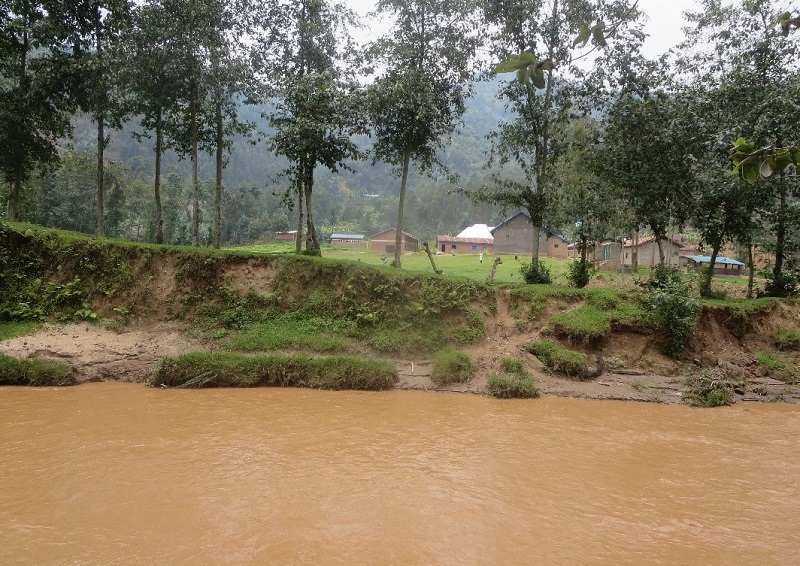Bridges to Prosperity programme
Contents |
[edit] Introduction
Young engineers will be working on the Bridges to Prosperity programme to help build infrastructure to connect people in developing countries, but need the support of the engineering community to help fund this vital work.
Rural isolation is often cited as a root cause of poverty. Connecting communities to essential education, healthcare facilities and economic opportunity is one of the cornerstones of social development and genuinely life-changing.
COWI UK has teamed up with WilkinsonEyre Architects to build its fifth bridge in Rwanda with the charity Bridges to Prosperity (B2P). The Kazabe footbridge will be a great help for the local community and create safe, all year-round access to facilities, schools and markets.
[edit] Building connections to development
Almost 1 billion people around the world don't have safe access to critical resources like healthcare, education, or employment due to an impassable river.
With a single innovation, a bridge can have an impact on households across multiple dimensions.
When a community has year-round access to key resources like healthcare, education, markets and employment, residents have greater freedom - freedom to choose how they better their lives.
Safe access unlocks economic opportunity for a community. Farmers are able to sell their crops at outside markets or access agricultural inputs like fertiliser or seed. Bridges ensure consistent access to non-agricultural jobs. Women save time on household activities, spurring an increase in women entering the work force.
Last-mile connectivity goes beyond transforming local economies. When a rural community is networked to the world around them, they participate in the national and global economy, bringing transformation to the greater population as well as to their local community.
This is where a bridge can help.
[edit] About the Kazabe project
The residents of the Kigarama-Musabike community farm tea, beans, maize, and sweet potatoes and sell their goods at the market to provide for their families.
Currently, the crossing is used primarily by students, who must cross in order to access primary and secondary schools, and tea plantation workers.
The Sebeya River is impassable 45 days out of the year, and hence, students cannot attend school, the tea plantation workers cannot safely get to work, and residents are isolated from the nearest health centre and market.
The 43 m Kazabe Suspension Bridge will provide safe, year-round access for the members of the communities who live nearby.
By providing reliable access to critical services, the bridge will transform not only the communities’ pedestrian routes but also their potential to thrive.
[edit] Help fund the Kazabe, Rwanda project
Engineers will travel this month to Rwanda to help build the bridge, but they need the financial support of the engineering community to do so.
[edit] Bridges built to last
[edit] Durability and sustainability
As leading bridge builders in the international development space, B2P designs, builds and maintains durable and environmentally sustainable bridges that provide safe access for generations.
It has spent years perfecting bridge designs and sustainable construction models, so engineers can work in any country efficiently and effectively.
All of the bridges are designed to be resilient to extreme weather events, with locally sourced and donated materials.
[edit] Technical inspection and maintenance
Professionals from around the world volunteer their time and resources to return to project communities, inspecting footbridges and providing support for upkeep.
Local residents also commit to maintain and inspect the bridge, and are trained to do so.
This article was originally published here by ICE on 15 Nov 2018. It was written by Balint Penzes, COWI.
--The Institution of Civil Engineers
[edit] Related articles on Designing Buildings Wiki
Featured articles and news
Creativity, conservation and craft at Barley Studio. Book review.
The challenge as PFI agreements come to an end
How construction deals with inherit assets built under long-term contracts.
Skills plan for engineering and building services
Comprehensive industry report highlights persistent skills challenges across the sector.
Choosing the right design team for a D&B Contract
An architect explains the nature and needs of working within this common procurement route.
Statement from the Interim Chief Construction Advisor
Thouria Istephan; Architect and inquiry panel member outlines ongoing work, priorities and next steps.
The 2025 draft NPPF in brief with indicative responses
Local verses National and suitable verses sustainable: Consultation open for just over one week.
Increased vigilance on VAT Domestic Reverse Charge
HMRC bearing down with increasing force on construction consultant says.
Call for greater recognition of professional standards
Chartered bodies representing more than 1.5 million individuals have written to the UK Government.
Cutting carbon, cost and risk in estate management
Lessons from Cardiff Met’s “Halve the Half” initiative.
Inspiring the next generation to fulfil an electrified future
Technical Manager at ECA on the importance of engagement between industry and education.
Repairing historic stone and slate roofs
The need for a code of practice and technical advice note.
Environmental compliance; a checklist for 2026
Legislative changes, policy shifts, phased rollouts, and compliance updates to be aware of.



















